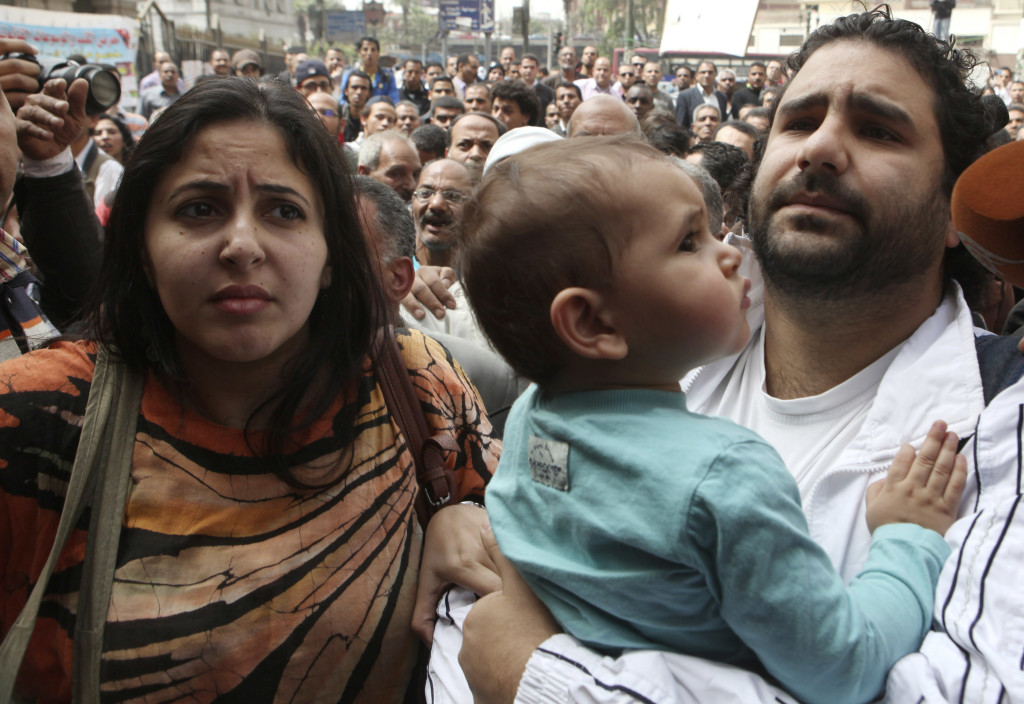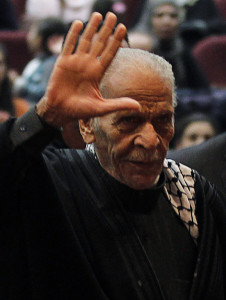
Alaa Abdel Fattah (R), one of the activists who was summoned by the public prosecutor on whether he had a role in the recent violent anti-Islamists protests, arrives with his wife and child to the public prosecutor’s office in Cairo, March 26, 2013. Fattah was arrested November 28 on charges he violated Egypt’s new anti-protest laws. REUTERS/Asmaa Waguih
Egypt’s new military-backed government has heightened its crackdown on dissent over the past week with a string of arrests.
Most recently, Tuesday morning, December 3, secular activist Ahmed Douma tweeted that he had been arrested at his Cairo home and taken to a police station. He said he did not know the reason for his arrest.
Douma was detained once before in April 2013 for calling former president Mohamed Morsi a “killer” and a “criminal.”
Monday, according to Egypt’s Al Ahram online, Alexandria police picked up Ahmed El-Hamrawy, the lawyer heading the defense team for the 21 women and girls sentenced to 11 years in prison last week for participating in a peaceful protest in Alexandria October 31 against the ouster of Mohamed Morsi. Seven of the women are minors–one is as young as 15–and they have been placed in juvenile detention until they are old enough to be imprisoned as adults. El-Hamrawy was later released.
Another prominent activist, Alaa Abdel Fattah, is being held in jail. Police raided his home at 10 pm last Thursday, November 28 on charges he called for a demonstration two days earlier in violation of a tough new law that effectively prohibits all political protest in the country. Abdel Fattah had organized a protest against an article in the new constitution which permits military trials for civilians.
Also arrested with him were 6 April movement founder Ahmed Maher and 24 others; Maher was released two days later, but Abdel Fattah will remain in jail for at least another two weeks.
In the current political climate, Egypt’s protesters are downloading a cell phone app that sends text messages to their families and lawyers in the event they are picked up by police. Beyt2ebed 3alia–the name of the app translates as, “I am being arrested”–works on both Android and Blackberry phones and does not require an internet connection.
Finally, there is sad news that another great voice has been silenced–but not by the government. It was widely reported that Poet Ahmed Fouad Negm died early Tuesday. He was 84.
Known as the ‘Poet of the People,” His poems dealt with themes of poverty and political resistance and could frequently be heard at protests including Tahrir Square in January 2011.
Among them: “I am the People,” English translation (below) courtesy of Jadaliyya:
I am the People
I am the people, marching, and I know my way
My struggle is my weapon, my determination my friend
I fight the nights and with my hopes’ eyes
I determine where true morning lies
I am the people, marching, and I know my way
I am the people. My hand lights life
Makes deserts green, devastates tyrants
Raising truths, banners on guns
My history becomes my lighthouse and comrade
I am the people, marching, and I know my way
No matter how many prisons they build
Mo matter how much their dogs try to betray
My day will break and my fire will destroy
Seas of dogs and prisons out of my way
I am the people and the sun is a rose in my sleeve
The day’s fire horses galloping in my blood
My children will defeat every oppressor
Who can stand in my way?
I am the people, marching, and I know my way

